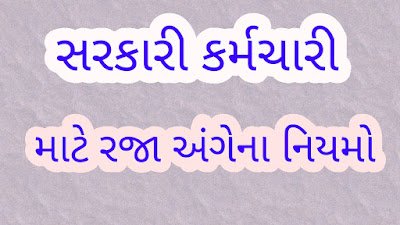Civil Service Rules Regarding Employee leave during employment
Common (TemporaryService) Rules, 1965 are outlined under Proviso to Article 309 and Clause (5) of Article 148 of the Constitution and after discussion with the Comptroller and Auditor General reference to people serving inside the Indian Audit and Accounts Department to deal with the states of administration of transitory Govt. workers. These Rules supersede the Central Civil Services (Temporary Service) Rules, 1949
the vast majority of the and orders consolidated inside the handout containing the Central CivilServices (Temporary Service) Rules, 1949 are still the powerful special case so far as they're conflicting with the CentralCivil Services (Temporary Service) Rules, 1965. The instructions/orders which are as yet pertinent have, along these lines, been given under the important principle for data and direction.
 |
| Civil Service Rules Regarding Employee leave during employment |
The Central CivilServices (Temporary Service) Rules, 1965along side the important requests gave by the Government every now and then are
1. Short, title initiation, and application.
(1) These guidelines could likewise be known as the Central CivilServices (Temporary Service) Rules, 1965.
(2) They will acquire power with impact from first May 1965.
(3) Subject to the arrangements of sub-rule (4), these guidelines will apply to all or any people:-
(I) who hold a common post including all regular folks paid from the safeguard administrations gauges under the govt of India and who are under
the standard making control of the President, however, who don't hold a lien or a suspended lien on any post under the govt of India or any State
Government;
(ii) who are utilized briefly in work-charged establishments and who have selected pensionary benefits.
(4) Nothing in these principles will apply to:-
(a) railroad workers;
(b) Government workers not in entire-time business;
(c) Government workers chipping away at contracts;
(d) Government workers paid out of possibilities;
(e) people utilized in extra-transitory foundations orin work-charged establishments beside the people utilized incidentally and who have opted for pensionary benefits.
(f) non-departmental telegraphists and telegraphmenemployed
in the Posts and telegraphs Department;
(g) such different classifications of representatives as could likewise be specified by
the Central Government by notification distributed inside the Official periodical.
2. Definitions
In these principles, unless the setting in any case requires:-
(a) "delegating authority" signifies in reference toa the indicated post, the position proclaimed naturally under the Central CivilServices
(Grouping, Control, and Appeal) Rules, 1965;
(b and c) precluded
"brief assistance" signifies the administration of a shortlived Government worker during an impermanent post or administering administration during a lasting post under the govt of India.
(e) "Safeguard Services" signifies benefits under the govt of India inside the Ministry of Defense and inside the Defense Accounts
Offices under the control of the Ministry of Finance (Department of Expenditure) (DefenceDivision) paid out of the Defense Service Estimates and
not for all time subject to the Air Force Act, 1950 (45 of 1950) or the military Act, 1950 (46of 1950) or the Navy Act, 1957 (62 of 1957)"
Administration of Indiasdecisions:
(1)
(a) Only assistance delivered during a common post under the govt of India is treated as transitory help for this reason.
(b) The expression "Taxpayer supported organization" includes periods of obligation and times of leave including remarkable leave.
(c) Prior assistance delivered in foundations paid from defence Estimates and fix delivered in Railway Department is additionally counted for semi permanency.
(d) "War administration" as characterized underneath will be counted as administration for motivations behind semi permanency:
(I) Service of any sort during a unit or formation responsible for administration abroad or in any operational zone;
(ii) Service in India under military, weapons, or store authorities with a risk to support abroad or in any operational region;
(iii) All other assistance including coercion to naval, military, or air force
Demise Gratuity
(2) inside the occasion of the death of a brief Govt. servant while in commission, his family will be qualified for family pension and demise tip at an equal scale and under comparable arrangements are appropriate to perpetual Central Civilian Government workers under theCentral Civil Services (Pension) Rules, 1972;
(3) No tip will be acceptable under this standard to a government worker,-
(a) who leaves his post or who is taken out or dismissed from administration as a disciplinary measure;
(b) who is re-utilized after retirement on superannuation or resigning benefits.
Given that a shortlived Government worker who left help to need up, with prior permission, a gathering under an association or Company completely or substantially owned or constrained by the govt or in or under a body controlled or financed by the government will be paid terminal tip at the speed recommended under sub-rule (1) in regard of the administration delivered by him under the Government:
Important Link
શિક્ષકો માટે અર્ધપગારી રજા ની સંપૂર્ણ સમજ
પ્રસુતિ રજા
કે રજા
તમામ રજાના નિયમો
રજાના નિયમો ની pdf ફાઇલ ડાઉનલોડ કરવા અહીં ક્લીક કરો
Raja Na Niyamo PDF File Click Here
Given further that a short-lived Government worker who has been consumed during a Centralautonomous body, with the consent of the parent division, will have a choice to tally the administration delivered under the govt for the point of pension under the self-governing body if it's a benefits plot, instead of drawing the terminal tip under the essential stipulation.


No comments:
Post a Comment
If you have any doubt let me know